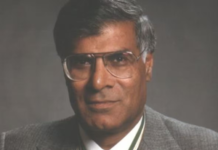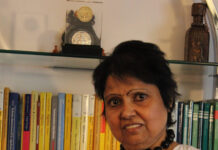By Vikas Datta
Even if you haven’t seen any of his films, every time you see a cinematic depiction of a socially inept but lovelorn academician or a comic duo of a straight man and a zany counterpart (something like the Johar-Mehmood pairing in Bollywood), its courtesy this American comedian. And Jerry Lewis was a rare Hollywood star who was also most popular in France and a teacher of Steven Spielberg and George Lucas.
Jerry Lewis, who died on Sunday at the ripe age of 91, was a gifted comic performer, both solo and in tandem, and known for pushing the envelope. “I get paid for what most kids get punished for,” he quipped.

While he is remembered for “Sad Sack” (1957), based on the comic character, “Rock-A-Bye Baby” (1958), “The Ladies Man” (1961), “The Nutty Professor” (1963) and a small cameo as the speeding motorist who runs over the police chief’s hat in “It’s a Mad, Mad, Mad, Mad World” (1963), it was his decade-long partnership with Dean Martin that made him a household name, with their 17 films and countless other performances.
Comic duos are not uncommon to Hollywood — Laurel and Hardy, Bing Crosby and Bob Hope, and so on but Martin-Lewis were different. First of all, they both were from ethnic minorities — Lewis (born Joseph Levitch) was Jewish and Martin (Dino Paul Crocetti) was Italian. Then they relied more on banter and a natural chemistry rather then acting set piece. “Other comedy teams never generated anything like the hysteria that he and I did, and that was because we had that X factor — the powerful feeling between us. And it really was an X factor, a kind of mystery,” Lewis recalled.
But his zany antics, natural ‘nutty’ comedy and ability to change his tone and pitch coupled with Martin’s debonair charm and rich made them not only popular voice but also the highest-paid in showbiz during their heyday in the early 1950s. And even after their inexplicable split in 1956, he had a successful solo career and contributed to social causes.
Born on March 16, 1926 at Newark to Russian Jewish parents, Lewis could draw on parental influence with his father Daniel Levitch, a master of ceremonies and vaudeville entertainer using Danny Lewis as his onstage name, while his mother, Rachel was a piano player for a radio station. Lewis himself started performing at age five, and would often accompany his parents.
While he was a good baseball player, and said to be good enough to play professional, he became a full-time vaudeville performer after dropping out of high school, claiming he was thrown out for punching out his principal who uttered an anti-Semitic remark. Appearing as Joey Lewis but soon changing it to Jerry Lewis to avoid confusion with comedian Joe E. Lewis and heavyweight boxing champion Joe Louis, he was famous for his ‘Record Act’, exaggeratedly miming the lyrics to songs on a phonograph.
He teamed up with Martin, then a nightclub singer, in 1945 after they met at New York club. They debuted at an Atlantic City club on July 25, 1946 with Martin singing, Lewis engaged in pure slapstick, making shambles of his partner’s performance. Though they were not a big draw initially, once they dispensed with a pre-written script and began improvising, their popularity spread like wildfire.
From nightclubs, they moved to films, TV shows and even when Lewis went out on his own as an actor and director, there was no looking back. As a director, he maintained full control, which led French audiences to admire his work.
However, he couldn’t achieve his biggest desire — to direct a movie version of J.D. Salinger’s “The Catcher in the Rye”, with whose main character Holden Caulfield he strongly identified, but failed to acquire the rights from its famously reclusive author.
But, despite all this and his health maladies ever since the 1960s, Lewis was content with his life. “I’m a multi-faceted, talented, wealthy, internationally famous genius. I have an IQ of 190 — that’s supposed to be a genius. People don’t like that. My answer to all my critics is simple: I like me. I like what I’ve become. I’m proud of what I’ve achieved, and I don’t really believe I’ve scratched the surface yet,” he said. (IANS)
















